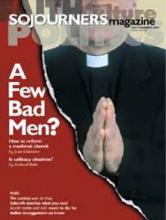The question everywhere is the same these days: What, in the long run, will be the effect of the pedophilia scandal on the Catholic Church? Speculation ranges from predictions of total collapse to speculation about total reconfiguration. Given the long lessons of history, neither hypothesis is likely, perhaps, but we may have already been given a mirror into the future of change. Let me tell you what I've seen already.
It was 1996. I was in Dublin at the time writing a book. To do concentrated work I had gone away to live alone in a small townhouse on the canal. For a while, there were no distractions at all. But then the first pedophilia scandal erupted in Ireland. I found myself as immersed in the story as the rest of the country but, as an outside observer, more concerned about the overall effects of the situation than by the cast of characters. I began to understand that the Irish, too, were dealing with this situation differently than they had in the past.
The Irish had already dealt with the case of a bishop who had fathered a son years before, supported him financially all his life, but never acknowledged him. They had read themselves weary about the young pastor who dropped dead leaving a mistress housekeeper and their children who were now suing the diocese for his estate. They had watched the church battle the government over the legalization of contraception. The Irish, it seemed, were well battle-tested on sexual scandals.
Read the Full Article
